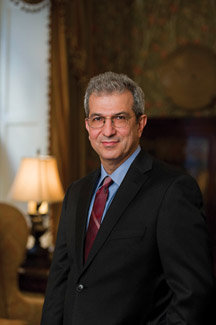After a scandal at the Stevens Institute of Technology in Hoboken, the university has named a new president. However, the future of the university’s continued development near the waterfront is not as certain.
The Board of Trustees named Dr. Nariman Farvardin, the provost of the University of Maryland, as the seventh president of the college last week.
Stevens now hopes to move beyond the controversial finale of the tenure of their previous full-time president, Harold Raveche. He resigned from his position after 22 years of service following a lawsuit against Stevens by the state attorney general’s office. Among other things, the state said Raveche was overcompensated and alleged that the college mishandled its finances.
“I am thrilled by the opportunity to serve Stevens as its seventh President.” – Dr. Nariman Farvardin
________
Since that time, Provost George Korfiatis has served as the interim president of the university. Korfiatis will continue to serve until July 1, when Farvardin takes the helm. Farvardin will receive a base salary of $625,000, and will be eligible for future performance-based incentive raises, according to the university.
Uncertain future for garage plan on Sinatra Drive
Meanwhile, a new parking garage that opened for students for the fall semester in 2010 has been the center of a different debate.
More than five years ago, Stevens began construction on what became a parking garage on Sinatra Drive, under the glass windows of the Babbio science center.
However, activists complained that the university did not obtain the proper approvals, so the construction was temporarily halted.
In September of 2009, Hoboken’s Zoning Board of Adjustments granted the university 12 variances to build the four-story garage, which had been mostly built anyway.
Then the variances were appealed by a local waterfront advocacy group, “Fund for a Better Waterfront.”
FBW, who had led the charge to stop construction originally, does not agree with some of the planning impacts of the garage.
“[This process] is something that’s dragged on for quite a while,” said Ron Hine, executive director of the Fund for a Better Waterfront. “In August, the [city attorney] drafted a resolution for the City Council to pass.”
The city’s resolution would change the terms of the variance approvals. It has not yet come before the council because FBW and Stevens had to look at it and respond.
“We responded to that immediately,” Hine said. “Then they waited to get a response from Stevens, and nothing was forthcoming.”
However, despite the ongoing debate, Stevens said last week that the garage opened for use by students starting last semester.
Several city officials declined to comment on the issue or said they were unsure of the details, including whether the city should get to use part of the garage.
Hine said he has concerns about Stevens’ future development near the garage, including a plan to alter a traffic pattern near the structure.
“There are a number of different aspects of [the garage plan] that haven’t been executed yet,” Hine said. “Fifth Street should come straight down to the waterfront. Sinatra Drive needs to be made pedestrian and bicycle friendly. The way Stevens has designed it has made it like a highway along the waterfront.”
Hine said he believes the lack of discussion on the matter may have come from the fact that the school’s leadership was in limbo.
“We want Sinatra Drive to be pedestrian and bicycle friendly, so there’s ways to design the street so that will happen,” Hine said. “The plan approved by the Zoning Board failed to remedy that problem.”
Now that a new president is in charge, Hine hopes to see the issue move forward.
Ray Smith may be reached at RSmith@hudsonreporter.com
Farvardin’s background
Dr. Nariman Farvardin, the new president of Stevens, received his B.S., M.S., and Ph.D. degrees in Electrical Engineering from Rensselaer Polytechnic Institute in 1979, 1980, and 1983 respectively, according to his profile on the University of Maryland website.
“I am thrilled by the opportunity to serve Stevens as its seventh president and deeply honored to have received the vote of confidence of its Board of Trustees,” Farvardin said in a statement. “In Stevens, I have found a university with a remarkable history, vibrant education and research programs, a deeply rooted culture of innovation, and caring and committed constituents.”
He continued, “I earnestly believe in Stevens’ mission and potential, and I look forward to working with the Stevens community to propel the Institute to even higher levels of achievement.”
Throughout his 27 years in Maryland, he served as an assistant professor, and then “worked his way through the administrative ranks” as chair of the Department of Electrical and Computer Engineering, dean of the A. James Clark School of Engineering, and the senior vice president for academic affairs and Provost since 2007.
“Dr. Farvardin is a nationally renowned leader in higher education with a passion for excellence,” said Wallace D. Loh, president of the University of Maryland, in a statement. “He has great talent, impeccable integrity, and an exceptional understanding of our institution’s best interests.”
Loh also stated that Farvardin has a “long list of achievements at Maryland” including “introducing innovative educational programs, increasing research funding and research partnerships, and securing landmark gifts to advance engineering excellence.”
Farvardin is a Fellow of the Institute of Electrical and Electronics Engineers and a member of the American Society for Engineering Education.
Farvardin also served as the interim president of the University of Maryland, an institution with nearly 40,000 students, from September to October 2010.
Stevens has 2,234 undergraduate students and 3,700 graduate students. – RS
